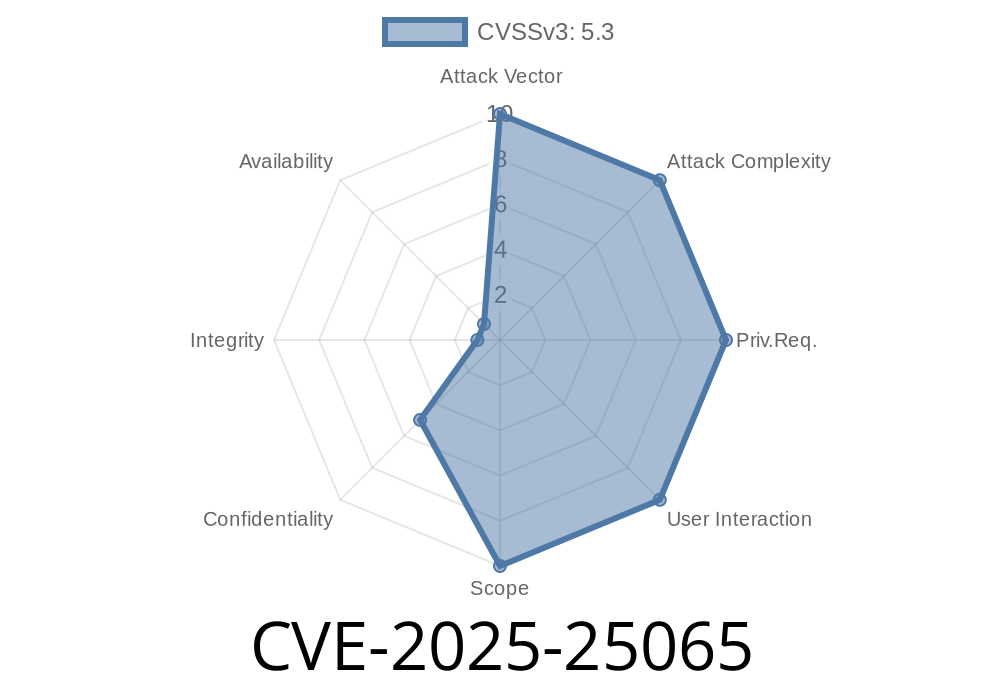---
Overview
In early 2025, a significant vulnerability — CVE-2025-25065 — was disclosed affecting Zimbra Collaboration Suite (ZCS). This Server-Side Request Forgery (SSRF) exists in Zimbra’s RSS feed parser, exposing internal services and network endpoints to attackers.
If your Zimbra installation is before 9.. Patch 43, 10..x before 10..12, or 10.1.x before 10.1.4, your server could be at risk. In this post, I’ll break down how this SSRF works, walk through a code snippet and exploitation, and show you how to stay safe. If you’re running Zimbra, read on!
10.1.x (before 10.1.4)
- CVE ID: CVE-2025-25065
- Risk: Attackers can send requests to internal network assets, possibly accessing sensitive data or pivoting within a private network.
How Does the Vulnerability Work?
Zimbra lets users add RSS feeds to the webmail client. The backend fetches and parses the feed’s URL. The problem? Early versions don’t properly validate user-supplied URLs. This opens the door for SSRF, letting an attacker:
1. Submit a malicious RSS feed URL (pointing, say, at http://127...1:808/admin).
The Zimbra server fetches and parses it, even if it's an internal address.
3. The attacker learns about internal services, open ports, or can even retrieve restricted internal data.
Example Attack Scenario
Let’s say Zimbra is hosted at mail.company.com. The attacker creates an RSS feed with a URL pointing to http://localhost:3306/ (the local MySQL database port) and adds it to their Zimbra account.
If the feed parser doesn't block local addresses, Zimbra itself tries to fetch http://localhost:3306/ — letting the attacker know what’s there, or in some setups, grab actual internal content.
Here’s a simulated Python snippet (not actual Zimbra code, but captures the risky logic)
import requests
def parse_rss_feed(feed_url):
# BAD: No validation here!
resp = requests.get(feed_url) # SSRF occurs here
if resp.status_code == 200:
# parse the RSS here...
return resp.text
else:
return None
# Attacker's malicious feed URL
malicious_url = "http://127...1:80/";
parse_rss_feed(malicious_url) # Sends an internal request!
Notice: there’s no check to see if the URL points to an internal address, local IP, loopback, etc.
The attacker creates a feed URL like
http://10...1:808/private-api/
or even
http://localhost:3306/
Log into the webmail client.
- Go to the feeds/RSS section.
References
- NVD: CVE-2025-25065
- Zimbra Release Notes
- OWASP - SSRF Explained
- Zimbra Advisory
January 2025: Security researchers report the issue.
- Late February 2025: Zimbra publishes fixed versions (see release notes).
How to Stay Safe
1. Update Zimbra ASAP
Apply Patch 43 (9..), 10..12 (10..x), or 10.1.4 (10.1.x).
2. Limit Outbound Access on Zimbra Servers
Restrict the Zimbra server's network egress permissions at the firewall.
3. Monitor Internal Network Logs
Look for unexpected requests from Zimbra's server IP to internal resources.
4. Disable Unnecessary Services
If you don’t use RSS in Zimbra, consider disabling it.
Summary
CVE-2025-25065 is a powerful reminder: always validate user-supplied URLs, especially when making server-side requests. If you run Zimbra Collaboration, patch now — and review your internal network exposure.
> Got questions about this bug or Zimbra in general? Drop them in the comments!
Further Reading
- Zimbra Forums Security Announcements
- CVE-2025-25065 on MITRE
Timeline
Published on: 02/03/2025 20:15:37 UTC
Last modified on: 03/13/2025 21:15:43 UTC
